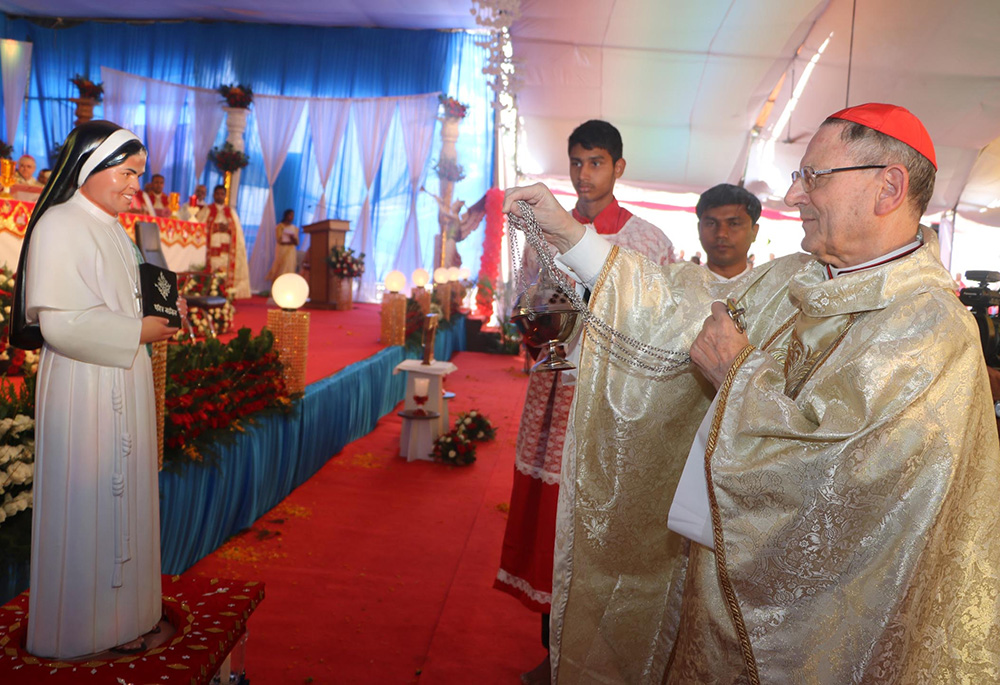
The bedroom of Blessed Sr. Rani Maria Vattalil is pictured. Vattalil, a Catholic nun martyred in 1995, was a member of the Franciscan Clarist Congregation, and was beatified in 2017. Her room is held in reverence, attracting people who visit to seek her intercession, in Udayanagar, India. (Courtesy of Tessy Jacob)
In society some people willingly lose their identities to give dignity to those entrusted to their care. They wear the face of God, irrespective of what society attributes to them. Among the many such good Samaritans in the society, the role of a priest or a nun is highly distinguishable.
"The Face of the Faceless" is a film produced in India based on the life of Blessed Rani Maria Vattalil. The film movingly depicts the life, mission, martyrdom and the cause of her elevation to the altar of veneration as Blessed Rani Maria.
Sr. Rani Maria Vattalil belonged to the Franciscan Clarist Congregation. She was born in the southern Indian state of Kerala, and worked as a missionary in Madhya Pradesh, one of the central Indian states. Her work among the poor and socially vulnerable in the region irked landlords who suppressed and exploited them. Rivals plotted against Sister Rani Maria and on Feb. 25, 1995, she was brutally murdered while traveling on a bus.
Her martyrdom stood as the testimony of "No one has greater love than this: to lay down his life for his friends." To the people in that region, no one needed to explain what it means to be a Christian, they witnessed it. They had a "didi" (elder sister) coming around to attend to them, and one day, the foes eliminated her. The story didn't end there; her parents had the tremendous courage to forgive and accept the convict as their son!

Cardinal Angelo Amato, prefect of the Congregation for Saints' Causes, blesses the statue of Clarist Sr. Rani Maria Vattalil following her Nov. 4, 2017, beatification Mass in Indore, India. Sister Rani Maria was stabbed to death in 1995. (CNS/Anto Akkara)
Sister Rani Maria was an ordinary nun until her death; she lived among other faceless individuals in society. The film symbolizes the face of thousands of men and women who selflessly work for God's mission and represent those who were eliminated brutally.
The film is the first of its kind in India, explicitly showing the life of a religious nun. The film does not dwell on the emotional aspect of martyrdom alone but emphasizes what it means to be a missionary, working among people unknown to them. In ordinary circumstances, the reward for selfless service is often a betrayal or rejection. After a service is done, we move on, as Luke:17:10 mentions: "We are unworthy servants; we have only done what our duty was."
The life of a consecrated person is complex and there are many who do not understand the nuances of it. It surprises me that even after centuries, and despite working visibly in society, people do not understand who a 'sister' is! In the Indian context, "convent education" — getting educated in a Catholic institution — stands as a symbol of quality and privilege. Yet, the perception of nuns and their way of life remains highly speculative, like the Hollywood blockbuster film "The Nun."
Except for a few special cases, the lives of sisters are a real sacrifice. The doctors and nurses in the health care field, schoolteachers and social service workers in the villages, slums and alleys work without an individual identity. One summer, I noticed that the skin tone of one of our sisters was nearly charred. She ministers with the slum dwellers and her commitment calls her to attend to them, irrespective of any harsh weather. In another instance, a sister physician, having contracted COVID-19 and a high chest infection, spent her recuperating days treating patients through telemedicine. Nonetheless, it is a universal phenomenon.
A consecrated person who takes up the call to walk on the paths of Christ, loses one's own identity and merges with the cluster that one has chosen. Yes, it is a free choice and a special grace to live, love and serve people who are totally unknown to us. In the pursuit of giving faces to others, we remain faceless with a collective noun: "sister." We may receive more thorns than roses, more demands than requests, and more accusations than words of appreciation. We admit we are not perfect nor well equipped, but we live a call that many others have not received.
Advertisement
The changing sociopolitical and religious scenario of India causes greater risk for consecrated men and women, as our service to the society is misinterpreted. The number of innocent priests and nuns languishing behind bars is increasing. Society needs us to care for the sick, abandoned, orphans and the needy. They entrust their children to our care for quality education, choose our hospitals for genuine care, and request our prayers. However, at the slightest provocation, some vandalize our institutions, insult us for our dressing, defame our character, and even threaten us with dire consequences.
When trouble brews up unexpectedly from any corner, John 15:18 comes alive: "If the world hates you, keep in mind that it hated me first." In this ever-changing world, every day presents a challenge to keep the flame of love for others burning, despite the value attached to it.







